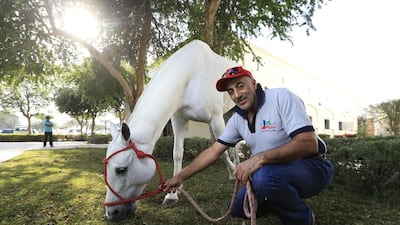With the Dubai World Cup fresh in the memory, it is worth recalling that there is another “sport of kings” - and of sheikhs, shahs and khans too. Polo has a history going back thousands of years, to gruesome origins (some say) when the head of a defeated enemy was used as the ball and the game played on the arid steppe of Central Asia.
None of that is in evidence of course on the genteel fields of Dubai Polo & Equestrian Club, but that is where you find Abdelrahman AbdAllah Abbar, or “Dr A” as he is known on the polo circuit. Dr A’s team is not the biggest nor the richest in the UAE, but he is known locally as a connoisseur of the sport, and well connected among the more elite players of this increasingly popular game.
“There is an incredible rush you don’t get in other sports. I’ve played rugby, football, hockey, cricket, athletics buy never got the rush I get from polo,” says Dr A.
Big business is also feeling the rush. A glance through the sponsors’ list at the Dubai club shows Emirates NBD, Al Habtoor and Standard Chartered, alongside luxury brands like Bentley and Cartier. While not at the financial level of the World Cup, perhaps, it is still a rich man’s sport.
Dr A’s business background is well established. His family made its fortune in the food import-export business and shipping in his native Saudi Arabia, and for a while as a young man he joined the family business, the Abbar Trading conglomerate.
Then he went to law school in the US and became one of Saudi’s top oil industry lawyers, as well as holding a string of judicial and representative positions. He’s still involved in the family business, but these days he says he is “semi-retired”, devoting much of his time to polo in Dubai and Spain.
But he brings a business eye to the game. “Polo hasn’t matured as quickly in a business sense as other horse sports, like horse racing and equestrianism. The finances and sponsorship are not that big yet. It is still an elitist sport, without the popular appeal of Formula One, for example, which can attract huge companies to advertise and sponsor. There is a lot of opportunities here for polo to grow,” he says.
Also, it seems a quite specific system of organisation and ownership has grown up in the UAE. “Here, it tends to be the team owner that buys the ponies and pays professionals to ride for him; elsewhere, professionals tend to own their own ponies,” he says. (Horses are traditionally referred to as “ponies” in polo, although there is little apparent difference.)
Owning a team can be an expensive business. A pony can cost anything from US$5,000 to $200,000 (“a $200,000 pony is as fast as the wind and can turn on a dime”, says Dr A), and transportation costs are also significant. The pampas of Argentina are the breeding grounds for most polo ponies, and it can cost up to $14,000 to transport an animal to the UAE from there.
Stabling costs about Dh2,000 per pony per month, says Dr A, whose 20 or so ponies are kept at the pristine stables close to the clubhouse and the Dubai club. “I pay over Dh100,000 per month in stabling and feeding costs, but that’s a lot cheaper than Spain. There, it can cost you up to $1m per month to keep a top team of 40 ponies.”
He keeps a team of another 20 ponies in Spain and lives there in a rented villa for the summer months, the Spanish polo season.
With those kind of expenses, it is no surprise that the leading teams in the UAE are owned and run by members of the Abu Dhabi and Dubai royal families, and by some of the billionaire merchant families, like the Al Habtoors.
But Dr A, who will only say he is “over 60”, has obviously caught the polo bug, and is unlikely to get over it now. “It’s all I can do to play four or five times a week at my age, I used to play every day. Men are not built for playing polo, it puts a great strain on the body, it’s unnatural really,” he says.
Then he adds, almost wistfully: “But what are the alternatives to polo? Yachts, aeroplanes, holidays, yes all these, but then I wouldn’t get the rush. I wish I could enjoy tennis or golf more.”
As he walks off back to the stables with his current favourite pony, a beautiful grey called Chilandrina, he jokes: “Lord Mountbatten [member of the British royal family and famous polo enthusiast] said there were only two ways out of polo – death or bankruptcy.” And he laughs.
fkane@thenational.ae
Follow us on Twitter @Ind_Insights

